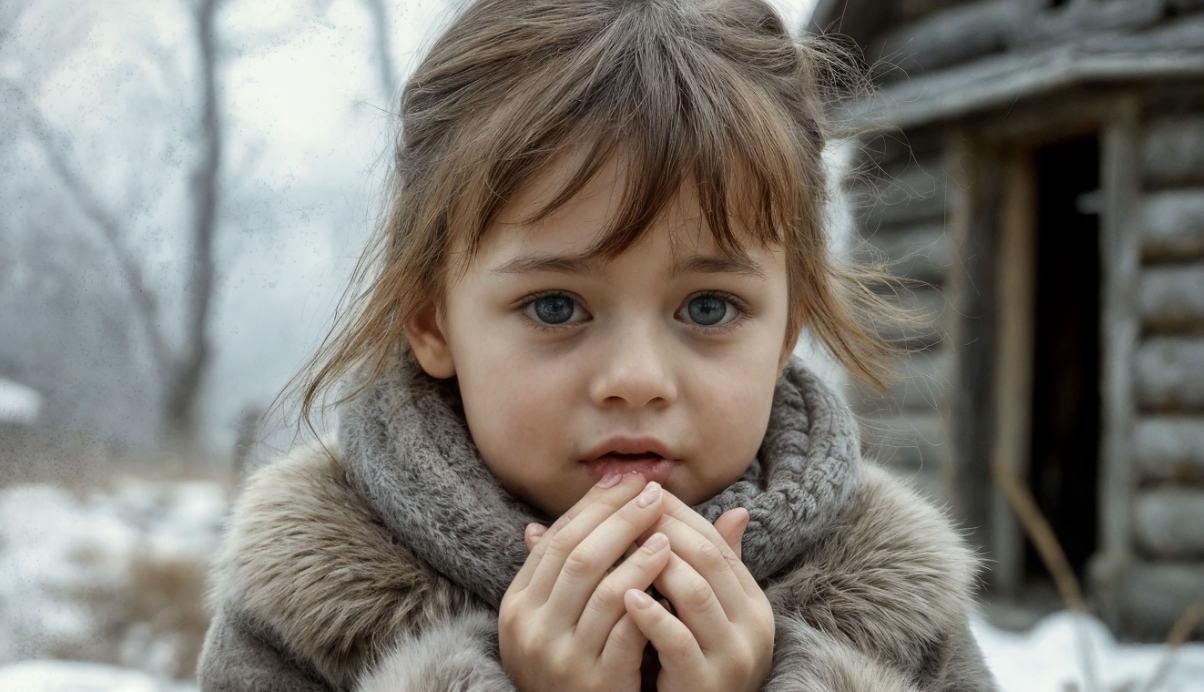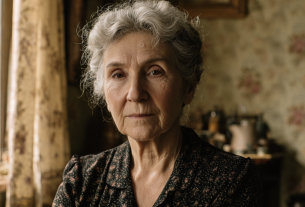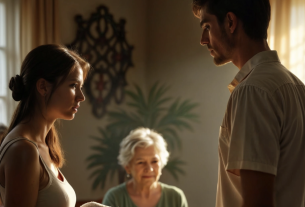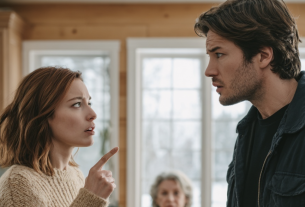Mother left on Wednesday afternoon and told her daughter not to go outside. When Polinka went to bed, the stove was still warm, but by morning the house had grown cold.
Mother was gone. The girl got out from under the blanket, put her feet into felt boots, and ran to the kitchen. Nothing had changed there.
On the table stood a sooty pot. Inside — Polinka remembered — were four potatoes boiled in their skins. The girl had eaten two the night before before going to sleep. On the floor stood an almost full bucket of water.
Polinka peeled two potatoes and had breakfast, dipping them in salt and washing them down with water. Cold air came from the cellar, and the girl climbed back into bed.
She lay under the blanket and listened to the sounds coming from outside. Polinka was waiting for the gate to slam and her mother to come back. She would light the stove, and the house would become warm. Mom would cook potatoes and pour them onto the table, and Polinka would roll them to cool them down faster.
Last time, Mom brought two cabbage pies, and Polinka ate them, drinking hot tea. Now there were no pies, no tea, and most importantly — it was already getting dark outside, but Mom still hadn’t come home.
Before it got completely dark, the girl sneaked into the kitchen and finished the remaining potatoes, took a cup of water, and placed it on a chair next to the bed. Then she wrapped herself in her mother’s old sweatshirt, pulled the hood over her head, and climbed back under the blanket.
Outside it was dark, inside the house cold. Polinka, a little six-year-old girl, lay in bed under an old quilt, trying to warm herself, waiting for her mother to return.
In the morning nothing had changed, except that the house was even colder and there was nothing to eat.
Polinka dragged five logs from the hallway — she had to go there twice to do it. Then the girl pulled a stool to the stove, stood on it, and used the poker to open the damper. It didn’t work the first time, and flakes of soot and some debris fell on her.
Polinka had often watched her mother light the stove and tried to do everything exactly the same. First, she put two logs in the stove, then tore several sheets from an old newspaper, crumpled them, and stuck them between the logs, placed dry birch bark on top, and another log on the bark. Then she lit the paper and bark. When the logs caught fire, she put in two more and closed the door.
After that, Polinka washed about ten raw potatoes, put them in a cast-iron pot, filled it with water, and, standing on the stool, pushed it into the oven’s niche.
The girl was tired after all that, but it seemed to her that the room was getting warmer. Now she had to wait for the stove to heat the house properly and for the potatoes to cook.
Once, Polinka had a father, but she didn’t remember him. He packed his things and left for the city because her mother often went visiting friends and, as grandmother said, “got drunk.”
While grandmother was alive, life was good for Polinka. The house was always clean, warm, and smelled of pies. Grandmother often baked pies with cabbage, carrots, and berries.
She also cooked delicious millet porridge in a cast-iron pot — she’d put a bowl in front of Polinka and a cup of melted milk next to it.
Back then, there was a TV in the house. Polinka watched cartoons, and grandmother watched films called by a strange word — “series.”
Without grandmother, things got really bad. Mother went out during the day and returned at night when Polinka was already asleep. There was often no food at home, and the girl made do with boiled potatoes and bread.
Last spring, mother didn’t plant a garden, so this year there were even fewer potatoes. Polinka didn’t know where the TV had gone. Mother hadn’t left for so long before.
The house warmed up, the potatoes cooked. Polinka found a bottle of sunflower oil in the kitchen cabinet. There wasn’t much oil — just a tablespoon — but hot potatoes with oil taste much better than cold ones without anything.
Brewing raspberry leaf tea in a cup, Polinka drank hot tea and felt warm. She took off her mother’s sweatshirt, lay down on the bed, and fell asleep.
The girl woke up from noise. Neighbors were talking in the room — Baba Masha, Grandpa Egor, and some unfamiliar man.
“Zakharovna,” the stranger addressed Baba Masha, “take the girl to your place for a couple of days. I called her father — he’ll come on Sunday.
An investigator and a doctor will come from the district now. I’ll wait for them here.”
Baba Masha looked for clothes for Polinka, found nothing, put the same old sweatshirt on her, and wrapped an old grandmother’s scarf over it.
When they went out into the hallway, Polinka saw something near the woodpile covered with two sacks. A leg stuck out from under one, wearing a mother’s boot.
Baba Masha took Polinka to her house and told her husband to heat the bathhouse. She washed the girl, thoroughly steamed her with a birch broom, wrapped her in a big towel, seated her in the anteroom, and told her to wait. A few minutes later, she returned with clean clothes.
Polinka sat at the table in flannel pajamas and wool socks. A white scarf with light blue dots was tied on her head. A plate of borscht stood before her.
A woman entered the room, looked at Polinka, and sighed deeply.
“Here, Maria Zakharovna,” she handed Baba Masha a big bag, “some things for the girl. Mine have grown out of them. There’s even a winter jacket here. What a grief.”
“Thank you, Katya,” Baba Masha replied and turned to Polinka, “Have you eaten? Let’s go; I’ll turn on cartoons for you in that room.”
That day and the next, several women came to Maria Zakharovna. From bits of conversation, Polinka understood that her mother was found frozen in a snowdrift quite by accident. Also, someone called her father, and he would arrive soon.
Polinka felt sorry for her mother and missed her. At night, she quietly cried, covering her head with a blanket so no one would hear.
Her father came. Polinka looked curiously at the tall dark-haired man she barely remembered. She was a little afraid of him and kept her distance. He also studied the girl and only once, when they met, awkwardly patted her on the head.
Father couldn’t stay long, so they left the next day. Before leaving, he closed the shutters, nailed boards crisscross over the windows and doors, and asked neighbors to watch the house.
Baba Masha said goodbye to Polinka:
“Your father has a wife — Valentina. She will be your mother. Listen to her in everything, don’t argue. Help around the house. Then she will love you. Besides your father, you have no one, and no other home except your father’s.”
But Valentina never loved Polinka. The woman had no children of her own and probably didn’t know what it meant to love children. But Valentina didn’t mistreat the girl. She made sure Polinka was always neatly dressed, though she rarely bought new clothes, content with what colleagues and acquaintances gave her for the girl.
As soon as father brought Polinka, Valentina “arranged” for the girl to go to kindergarten. In the morning she took her there, in the evening picked her up after work. At home, she immediately started cooking dinner or doing other chores, and Polinka sat in her room looking out the window or drawing.
Father also rarely talked to his daughter, believing that he did everything necessary for her: fed, clothed, and shod — what else?
When Polinka started school, she caused no trouble for either father or Valentina. She studied normally, mostly getting fours, but had threes in math, physics, and chemistry. Teachers said she tried, but exact sciences didn’t come easily.
However, she was the best in craft lessons, especially when girls sewed, knitted, or embroidered. Even the teacher was surprised how skillfully Polinka did everything. Olga Yurievna would just show a new stitch or pattern, and Polina repeated it as if she already knew everything.
So Polina lived with her father’s family: from about age ten, she cleaned the apartment herself, could iron a mountain of laundry, and from thirteen cooked for the whole family. She only communicated with Valentina on household matters, but Polina seemed to want nothing more.
Father was pleased the home was peaceful, no adolescent crises his colleagues with daughters warned about. He considered her quietness and uncommunicativeness a character trait.
After ninth grade, Polina said she wanted to enter college and study to be a cutter and tailor. Father went with her to the industrial-economic college, they submitted documents, and in September Polina began studying.
She still did much housework but also began sewing. Valentina had an old sewing machine; Polina fixed it, and now it was no problem to hem towels, sew new curtains, or repair clothes. She did all this herself. Neighbors started coming to her — some to shorten pants, others to sew bedding of unusual sizes. She charged little, but didn’t spend the money — she saved it.
Three years flew by unnoticed. Studies ended, Polina turned eighteen.
Unexpectedly for her father, the girl announced she wanted to return to her native village.
“Are you unhappy here? Why are you leaving?” asked her father.
“You raised me, and I’m very grateful. But from now on, I’m on my own.”
Polina barely found her house. Unlike many others, her village wasn’t dying but growing — a new road passed nearby a few years ago, new residents came, and new houses were built.
The house that once seemed huge now looked like a shabby hut against the background of the tall two-story cottages. But some neighboring houses remained the same — Baba Masha’s on one side, Grandpa Egor’s on the other. She wondered if they were still alive.
Polina opened the gate — it creaked just like it did when little Polinka used to listen for that creak, waiting for her mother.
The girl climbed the porch. “No tools, no way into the house,” she thought.
Leaving her things on the porch, she went to Baba Masha’s house. Polina entered the gate and saw an elderly woman weeding flowerbeds.
“Hello,” said Polina.
The woman straightened up and looked closely at the girl:
“Hello. Who might you be? Your face looks familiar…”
“Maria Zakharovna, it’s me, Polinka.”
“Really, Polinka! And how much you look like your mother!” exclaimed Baba Masha. “You came!”
“Yes, but I can’t get into the house. Do you have a crowbar or something to pry off the boards?” asked Polina.
“Wait a minute!” she said and shouted toward the house, “Zakhar! Come here!”
A young man about twenty came out onto the porch.
“Grandson! Take some tool and help the neighbor open her house.”
An hour later, all the windows and doors were open, and Polina entered the house she hadn’t been in for twelve years. Here, in the hallway, lay her mother, or rather, her legs, wearing brown boots with scuffed toes — the last time she saw her.
Here was the quilted blanket on the bed she tried to warm herself with. The bucket, the cast-iron pot, the sooty pot. Polina felt as if she had returned twelve years ago.
She recalled Baba Masha’s advice: “Behave well, and they will love you. You have no other home except your father’s.”
“How could there be none? Here it is, old, with a crooked porch, but so dear!” thought Polina. “Here I will be happy!”
For almost a week, she washed, cleaned, did laundry, and painted. She found a stove specialist in a nearby village — he cleaned the chimney and fixed the stove, and Polina whitewashed it. She threw out piles of old junk from the pantry and attic and hung new curtains.
Zakhar helped fix the porch and the fence that had collapsed in several places.
All this time, villagers who remembered her and her mother came by, surprised she decided to move here from the city.
Her father probably wouldn’t recognize his quiet, reserved daughter — Polina’s face was always smiling. She was talkative and friendly.
A local tractor driver plowed her garden, and although it was late, Polina, guided by Maria Zakharovna, managed to plant something and tidy up the berry bushes.
“It’s okay, you’re late with seedlings this year, but next year you’ll plant everything you need,” said Baba Masha.
After finishing with the house, Polina got a job — not in her specialty yet. There was no tailor’s shop in the village where she could work, and she didn’t have a sewing machine. So she started working at the post office. Not sitting behind a window, but delivering mail to three neighboring villages.
They gave her a government bicycle, and Polina pedaled: two kilometers to one village, three to another.
With her first paycheck, she bought a sewing machine; with the second — an overlock machine. She began sewing — first for home, then customers appeared. A little, of course — the village isn’t a city — but gradually word spread in neighboring villages. People started coming.
And after a couple of years, another postman delivered the mail — Polina had enough of a garden and sewing income. Moreover, it became hard for her to ride a bike — she and Zakhar, whom Polina married, were expecting their first child.
Polina kept in touch with her father and Valentina; they came to the wedding, invited the newlyweds to the city. But they refused:
“My home is here,” said Polina.



